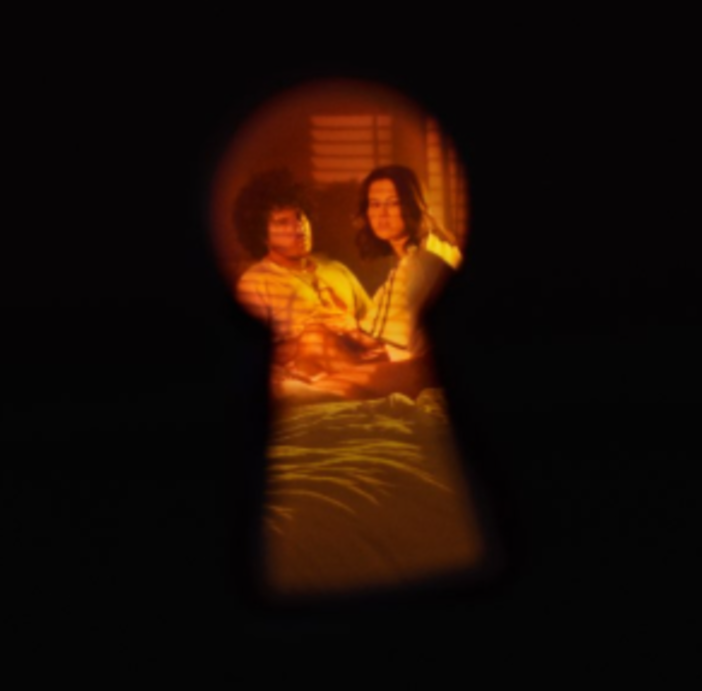The film production company A24 has become synonymous with thrilling, suspenseful and innovative storylines. When the film production company announced they would be creating a novel cult movie, titled Opus, starring up-and-coming actress Ayo Edebiri as the protagonist, cinephiles were ecstatic and anticipated great things. Despite the popular actress and the solid cinematography, Opus’ release to theaters on March 14 brought subpar reviews and disappointed audiences.
The film begins as the audience is introduced to the protagonist, Ariel Ecton (Ayo Edebiri), an aspiring novelist, with a day job at a popular entertainment magazine. One day, Ecton is mysteriously invited to an isolated retreat owned by a renounced pop star by the name of Morettii (John Malkovich), who has not been seen by the public for decades. She accepts the proposal in hopes of chasing an unlikely story, and upon her arrival on the property, she’s met with a horde of other journalists who have been invited to Morettii’s dwelling. Ecton’s stay, though enjoyable and relaxing at first glance, is riddled with unsettling moments and interactions with community residents, as well as off-putting ceremonial rituals. As her stay continues, she’s met with a bone-chilling reality: the retreat is a fully operational cult with psychopathic members who are scheming something sinister.
The greatest shortcoming of the film revolved around its storyline. The entirety of the film consisted of building slow-burning tension– with no shortage of eerie, inexplicable wide shots layered with menacing music– where there was excessive exposition and ideas that ultimately went nowhere.
Further, the characters underwent very little personal development. The only character in the film that genuinely wins over the audience is the Ecton, who is depicted to be an “everyman-esque” individual, that viewers can align with themselves. However this poses an issue: Ecton’s character is so typical, taking the most logical course of action in every frame of the film, so there is no personal growth or development. Ecton is a perfect character from beginning to end, with virtually no flaws, leaving the movie substanceless and boring. On the other hand, the character of popstar and cult leader Moretti is barely explored. Despite having a fairly interesting set-up with lots of potential for a complex backstory and character development, Moretti is seen as nothing more than an eccentric middle-aged man with an understanding for his follower’s obsessive fanaticism.
With a lack of genuine depth to the storyline, and characters with little to no personal development, Opus felt like a poor attempt to piggyback off popular films like Midsommar and Get Out within the same thriller genre. However, unlike these films – which provided meaningful commentary on themes of grief and benevolent racism while having plotlines keeping the audience at the edge of their seat – Opus struggles to carve out its own identity. Although the film attempts to present commentary on class disparities and the idea of parasocialism in the modern age, it relies on cryptic symbolism and drawn-out dialogue that feels more obscure than amounting to anything meaningful.
When the final scene ended, it felt like there was supposed to be another hour left in the film. The conclusion was reckless and abrupt, with no unexpected plot twist or any form of emotionally resonant resolution. It left the audience questioning if the time invested in its characters and story was truly worth it.
However, when Opus is examined from a strictly aesthetic perspective, it's undeniable that the film is visually stunning. From the use of color in the costume designs to the elaborate fever dream-like sets, Opus made up for the poor storyline with its cinematography. The choice to have Ecton wear colors that contrasted with other cult members and journalists reflected her “outsider” status as someone who stuck to her own personal beliefs rather than getting swayed by the disturbing ideologies and activities of the cult. Whether it was anxiety-inducing abstract art pieces sporadically placed in a zen garden or a singular bright orange hut intruding on the serenity of the natural landscape, the film’s sets complemented the uncanny feeling associated with the residents even before Ecton realized the community was a cult.
Additionally, Ayo Edebiri’s performance elevated the film, breathing life and emotional depth into an otherwise lackluster script. In a particular scene, Ayo Edebiri’s character is roped into witnessing a disturbing cultish ritual after attempting to flee the facilities. The desperation in her performance successfully immerses the audience into the otherwise underwhelming and predictable scene.
As an avid enjoyer of films that fall into the category of “so bad it’s good” cinema, Opus takes itself too seriously to be comical in any sort of capacity. Although the film may be an interesting watch to dissect with friends and kill boredom, there are much better films within the cult-related horror and thriller genre that would be a better use of time. Despite the film’s best efforts to be meaningful, with solid visuals and performances, it remains substanceless.















